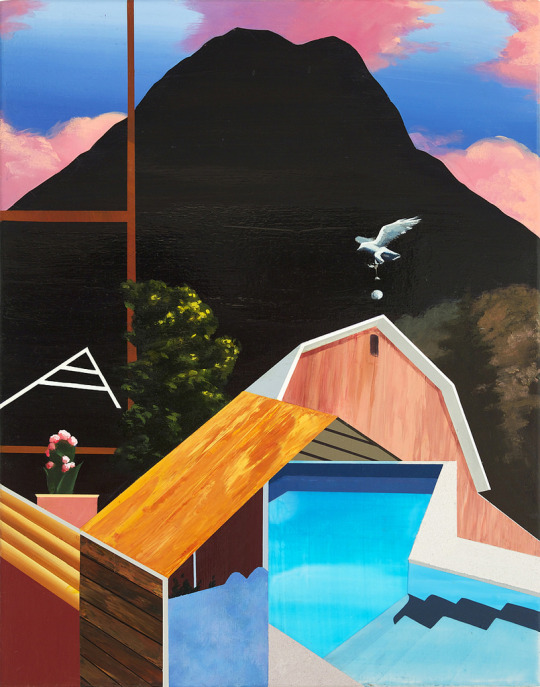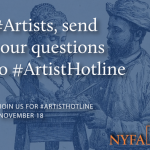Ask #ArtistHotline: Mastering Self-promotion
The first step of mastering self-promotion is viewing yourself as an creative entrepreneur.
As an artist, self-promotion is a valuable skill. Yet not everyone is of this mindset. Self-promotion can be intimidating and difficult to master. Most artists simply want their work to silently speak for itself. Noble but not always effective! The quality of your work remains paramount, but sharing your talent publicly is necessary for the progression of your career.
The first step of mastering self-promotion is viewing yourself as an creative entrepreneur. Creative entrepreneurs are constantly generating new ideas, networking and looking for professional opportunities for growth. This leads them to collaborate more often and strategically self-promote. Artistic passion and business know-how, along with the ability to evaluate opportunities, will take your career to the next level. Whatever your discipline, your creative work is a business. If you’re uncomfortable promoting yourself, you are likely to miss out on important opportunities.
During last month’s #ArtistHotline, a lot of artists inquired about self-promotion. We’ve expanded upon the subject in this post, reviewing the basic tools to help you succeed. So, where does one start with self-promotion? We have three easy-to-implement tips to help you overcome your fear of tooting your own horn.
Don’t be Afraid
You may feel a tad self-consciousness about self-promotion. But just think, if you don’t promote yourself, who else will? Get in the habit of sharing your talent and if desired, offering your services to the public. When you win an award or score a competitive fellowship, capitalize on opportunities to share your achievements. More often than not, people will support your efforts and help you get ahead professionally.
Ultimately, this is your opportunity to build your reputation and make your mark as an artist. Fear will only hinder your progress. Be diligent with assessing your art career goals and decide on what you’d like to achieve. Promote your art accordingly.
Champion Yourself
There is no need to hide your talent. Self-promotion is about highlighting your accomplishments and communicating your value to others.There are various online platforms to help you gain exposure, including e-mail newsletters and social media. One of the most important promotion tools is your website.
NYFA has a handbook for artists called The Profitable Artist, where we discuss the importance of building a website. Think of your website, as your virtual business card, it’s the “first significant point of contact that most people will have with you and your work, it’s a space that you construct to match your brand, personality, and goals. or anything else that is important to you. It is like having your own gallery, concert hall, or library.” Viewers who encounter your work could be future funders, collectors or collaborators. If you need direction on how to create your website, Creative Capital’s Internet for Artists Handbook offers a full website checklist to help you navigate the process.
Build your community
The success of your artistic career depends on a whole lot of factors. Part of self-promotion is developing personal connections with people who want to help your project or further develop your practice. Learning how to engage with artists and build a community is critical. Talking to your peers builds camaraderie, shapes your artistic vision and ensures you have the support when you need it.
To increase your exposure as an artist, make sure you spread the word to your existing community too. This includes your closest connections, like family and friends. Commit to sharing updates regularly on social media or letting people know about upcoming exhibitions on your website. Each time you create new art or receive an award, you have a new opportunity to promote yourself. Often the best way to get noticed is through word of mouth. When your artwork is recommended by a trusted friend, rather than a obscure link, you’ll experience greater engagement.
The aim of community building is largely about resource sharing, connecting with people and developing lasting relationships. Ideally, your community will support you when you’re developing an idea or need advice on a specific subject, like how to apply for a fellowship or complete a grant application. Like most people, artists need accountability partners. Over time you will discover people to discuss creative projects and commiserate with. More importantly, you’ll feel less isolated if you immerse yourself with like-minded people.
Remember, a great relationship is mutually beneficial. Whether you’re meeting people at a networking event in-person or chatting online, strive to make meaningful connections and contribute to the conversation. Don’t make it all about you. Practice participating in online forums like NYFA’s #ArtistHotline. During #ArtistHotline you can promote your artwork, discover useful online resources, and share advice on your own creative experience. The next discussion is scheduled on Wednesday, November 18, 2015.
You can also create your own community-oriented event, perhaps a peer review of your artwork or host a reading of your new play. Artist U provides practical approaches for building community and shaping your day-to-day artistic life. Their latest initiative The Making Your Life as an Artist Workbook focuses primarily on how to address career planning. By creating working group conversations, artists begin to participate in strategic group career discussions. In addition, their response becomes more proactive than reactive to challenging situations. Design ways to build your own community. Send an email to a new friend. Connect on Twitter. Build significant connections and expand your professional network.
Your talent is your calling card and letting others know of your accomplishments makes a huge difference in your professional development. Self-promotion can potentially lead to opportunities like exhibitions, fellowships and event cash grants.
– Glory Edim, Program Associate, Online Resource
Image: Maya Brym (Fellow in Painting ‘08)





